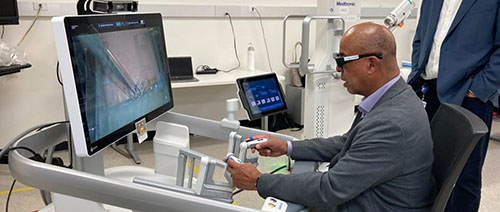Ready for the AI revolution in healthcare?
Chief technology and innovation officer says AI could change the future of healthcare for the better
Artificial intelligence is changing the way we drive cars, shop, and yes, how we receive healthcare. Just over four months ago, Ken Washington became our company’s first chief technology and innovation officer. After visiting Medtronic facilities around the globe, Washington is bullish on the future of AI in healthcare – as long as the technology is used safely and responsibly .

Here are four trends he sees on the horizon:
AI will become a trusted tool for doctors
Washington said that when people think about self-driving cars, they often consider the time they’ll save, or dream about sleeping or reading while their car takes them to where they want to go. But what they really should think about is how this technology will make them better and safer drivers, he said.
“Likewise, we need to change the way we think about AI in healthcare,” he said. “Artificial intelligence won’t replace doctors. It will help make better doctors. It will help them diagnose diseases faster and deliver more accurate and personalized treatment plans. It will make them more efficient with their time, which could help prevent clinician burnout.”
AI must be used to improve patient outcomes
Within the healthcare technology industry, the integration of AI and medical devices is already improving patient outcomes and empowering healthcare professionals, Washington said.
“How do I know? I’m looking at the data, just as I’ve done at Ford Motor Company, Amazon, and Lockheed Martin and the data clearly shows that AI-supported healthcare technologies are having a profound and measurable impact on patients’ lives,” he said.
AI and robots will drive ‘smarter’ surgery
Washington believes the next evolution within healthcare is “smart” surgical robots powered by artificial intelligence. Already, Medtronic has developed surgical robots that are compatible with AI platforms. Those platforms can help doctors plan surgeries, assess the efficacy of their procedures, and direct post-operative care.
“Could there be fully autonomous surgical robots in the operating rooms of the future?” Washington asked. “Only time will tell. Perhaps the better question is, ‘How do we create surgical robots capable of delivering the best possible healthcare?’ Artificial intelligence is undoubtedly part of the answer.”
The AI revolution in healthcare has begun – what happens next is up to us
As with any disruptive technology advancement, Washington said there will be skeptics. But he believes that using AI could improve healthcare for everyone, everywhere.
“I believe AI has the power to transform global health systems, to help them function as they should — efficiently and accessible to all,” he said. “As global healthcare technology leaders, it is imperative that we create responsible use principles to guide us on our AI journey. With those guardrails in place, our industry can use AI to create a future that serves patients and clinicians better.”
L001-11042023
Related content



